About us
ABOUT US
Origin and Founding of Kyokushin karate and Sosai Masutatsu Oyama
Kyokushin Karate, one of the most intense and respected martial arts styles globally, was founded by Sosai Masutatsu Oyama, known as Sosai Oyama, in 1953. Born in Korea in 1923 and later relocating to Japan, Oyama's early life was marked by his passion for martial arts. His journey began with studying traditional Korean martial arts, but his path truly took shape when he moved to Japan and began training in Karate, Judo, and other traditional Japanese martial arts.Oyama trained under prominent masters, including Gichin Funakoshi, the founder of Shotokan Karate. However, Oyama's vision extended beyond the confines of any single style. He sought to develop a martial art that would combine the most effective techniques with a deep philosophical foundation—one that would foster not just physical strength, but also indomitable spirit and character. This led to the creation of Kyokushin Karate, which translates to "the ultimate truth." The name reflects Oyama’s belief that the true essence of martial arts lies in continuous self-improvement and the pursuit of truth through rigorous training.
The 1950s and 1960s were pivotal decades for Kyokushin Karate. Oyama's dojo in Tokyo quickly gained a reputation as a place where only the toughest martial artists trained. His students were known for their endurance, strength, and ability to withstand and deliver powerful strikes. The discipline, respect, and intensity that characterized Kyokushin training attracted many martial artists who were looking for a deeper and more challenging practice.
By the 1970s, Kyokushin had established a global presence, with dojos across Asia, Europe, North and South America, and Africa. The rigorous training and philosophy of Kyokushin resonated with martial artists from various backgrounds, leading to the establishment of national and regional Kyokushin organization.

Kancho Noayuki Sonoda and Founding of INTERNATIONAL KARATE-DO ORGANISATION KYOKUSHINKAI SONODA :
Born in 1965, Sonoda began his Kyokushin journey at the age of 13. His early introduction to this demanding martial art shaped his life, leading him to dedicate himself fully to mastering the discipline.Kancho Sonoda's dedication and skill led him to become a Uchi-deshi (live-in student) under Sosai Oyama himself—a prestigious position that provided him with direct access to Oyama's teachings and philosophy. This period of intense training and close mentorship deeply influenced Sonoda, embedding in him the values of Kyokushin and the spirit of relentless pursuit of excellence.
During his competitive career, Kancho Sonoda achieved significant milestones that underscored his mastery of Kyokushin. In 1991, he won the All-Japan Kumite Championship in the Middle-Weight category, a testament to his skill and tenacity. He was also chosen to represent Japan in the 5th World Open Tournament Kumite Championship, where he advanced to the finals, showcasing the strength and effectiveness of Kyokushin on the global stage.
Kancho Sonoda's impact extends beyond his competitive achievements. With over four decades of experience, he is the chief instructor at the Sonoda Dojo in Miyazaki Prefecture, Japan. His leadership and commitment to Kyokushin have earned him respect and recognition within the martial arts community. In August 2019, he established the IKOK SONODA Group, which has rapidly grown to include branches in 102 countries. Under his guidance, the IKOK SONODA Group has become one of the fastest-growing Kyokushin organizations in history, ensuring that the teachings of Sosai Oyama continue to inspire new generations of practition

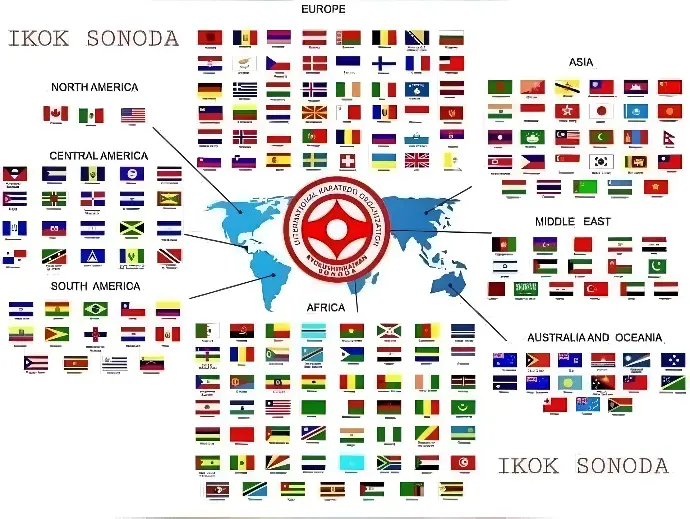
The Life and Martial Arts Journey of Sensei David Lee and History of Lee Dojo
Early Beginnings in Shillong :
Sensei David Lee was born in 1976 and embarked on his martial arts journey at the tender age of 7 in a small village in Shillong. His first teacher, Dawri, was a commando trainer who introduced Sensei David to the world of martial arts. Under Dawri’s guidance, Sensei David began honing his skills, laying the foundation for what would become a lifelong dedication to the art of Karate
Training in Kolkata Under Shihan Dadi Bulsara:
Under his tutelage, Sensei David trained in Ashihara Karate, a style known for its practicality and effectiveness in real combat situations. Shihan Bulsara’s headquarters in Kolkata became a crucible of intense training, where only the most dedicated students could thrive. Sensei David excelled in this environment, quickly rising through the ranks to achieve San Dan (3rd Dan Black Belt). His time under Shihan Bulsara was marked by a relentless pursuit of excellence, and he became one of the most outstanding students in the camp. This period was crucial in shaping Sensei David’s understanding of Karate, instilling in him the discipline and perseverance that would define his martial arts career.

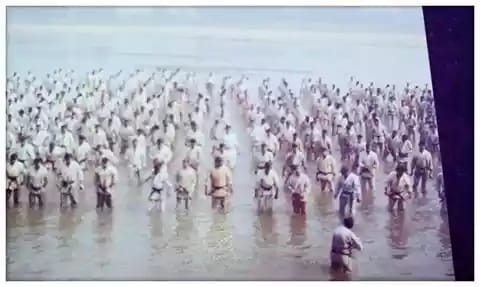

Advancement in Enshin Karate USA :
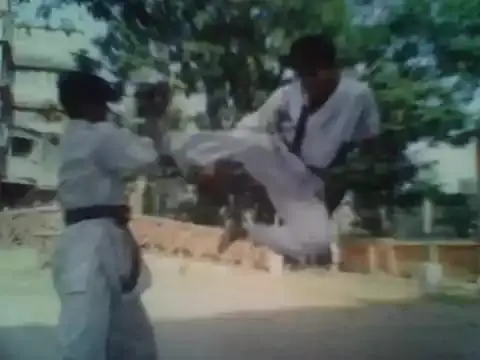
In 2007, Sensei David joined Enshin Karate (USA) under the guidance of Kancho Jōkō Ninomiya. Kancho Ninomiya, a renowned martial artist and one of the best students of Sosai Masutatsu Oyama, the founder of Kyokushin Karate, was known for his expertise and deep understanding of the martial arts. His excellency earned him the name 'Prince of Karate.'
Enshin Karate, developed by Kancho Ninomiya, is a derivative of Kyokushin Karate that emphasizes the use of circular movements to redirect an opponent’s force, making it highly effective in both self-defense and competition. Sensei David quickly adapted to this new style, excelling in its techniques and principles. His dedication and skill were recognized, and he achieved the rank of Ichidan (1st Degree Black Belt) in Enshin Karate.
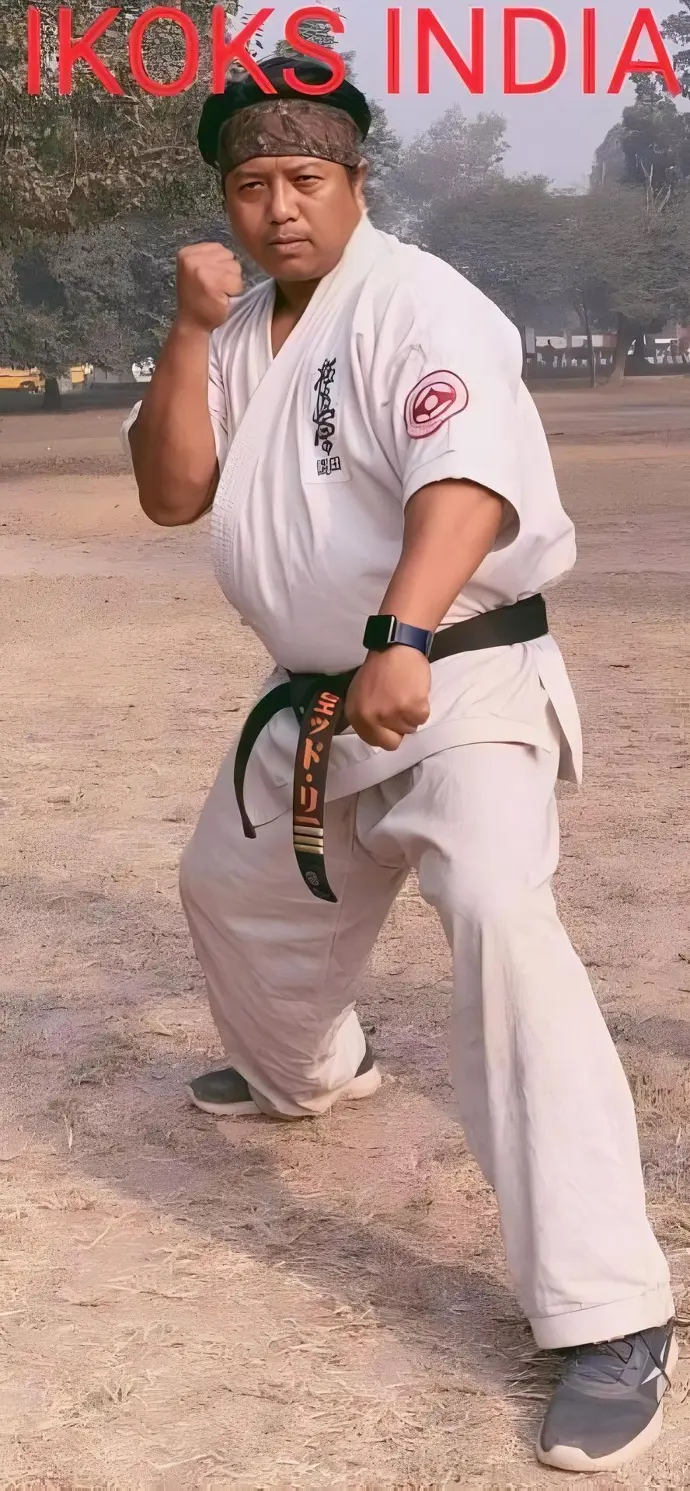
Mastery Under Kyokushinkai Sonoda :
Sensei David Lee’s martial arts journey continued as he sought to deepen his knowledge and skills. He joined Kyokushinkai Sonoda under the tutelage of Kancho Naoyuki Sonoda, a highly respected master with a long history in Kyokushin Karate. Kancho Sonoda’s teachings resonated with Sensei David, who embraced the rigorous training and strict discipline that Kyokushinkai Karate demands.
Under Kancho Sonoda’s guidance, Sensei David achieved the rank of 3rd Degree Black Belt. His time with Kyokushinkai Sonoda further solidified his expertise, and he became a respected figure within the Kyokushin community. The principles of Kyokushin—strength, endurance, and mental toughness—were deeply ingrained in Sensei David’s practice, influencing his approach to both training and teaching.
Development of Unique Self-Defense Techniques :
With decades of experience under his belt, Sensei David Lee didn’t just stop at mastering traditional Karate styles; he also sought to innovate and adapt. Drawing inspiration from various martial arts, including Krav Maga and Kalah from Israel and Silat from Malaysia, Sensei David developed his own unique self-defense techniques. These techniques are characterized by their practicality and effectiveness, tailored to address real-world situations. Sensei David’s approach integrates the hard-hitting, full-contact nature of Karate with the fluidity and adaptability of Krav Maga, Kalah, and Silat, making it a comprehensive self-defense system.
Establishing Lee Dojo and Continuing the Legacy :
Today, Sensei David Lee is the founder and head instructor of Lee Dojo, operating under the organization of Kyokushinkai Sonoda. At Lee Dojo, Sensei David has dedicated himself to passing on the legacy of Kyokushin Karate to a new generation of martial artists. His dojo is known for its rigorous training, discipline, and the high standards he upholds, reflecting the teachings of his esteemed instructors, from Shihan Dadi Bulsara to Kancho Naoyuki Sonoda.
Under his leadership, Lee Dojo has produced several skilled practitioners who have gone on to achieve great success in their own right. Among them is his son, Sensei Daniel Lee, who has not only inherited his father’s talent but also his dedication to the art of Karate. Another prominent figure at Lee Dojo is Sensei Robert Lee, Sensei David’s brother and another protégé who has also distinguished himself through his exceptional skill and commitment. Additionally, Sensei Suman Sarkar has excelled under Sensei David’s guidance, becoming a respected instructor and martial artist.
The Ever-Growing Legacy of Sensei David Lee :
Sensei David Lee’s journey through the world of martial arts is a testament to his dedication, perseverance, and continuous pursuit of excellence. From his early beginnings in Shillong to his advanced training under some of the world’s most renowned martial artists, Sensei David has accumulated a wealth of knowledge and experience that he now imparts to his students.
His story is one of growth and evolution, not just as a martial artist but also as a teacher and mentor. Through Lee Dojo, Sensei David continues to contribute to the world of Kyokushin Karate, ensuring that the teachings and principles of his mentors live on. His unique blend of traditional Karate and modern self-defense techniques makes him a dynamic force in the martial arts community, and his legacy is one that will undoubtedly continue to influence and inspire for generations to come.
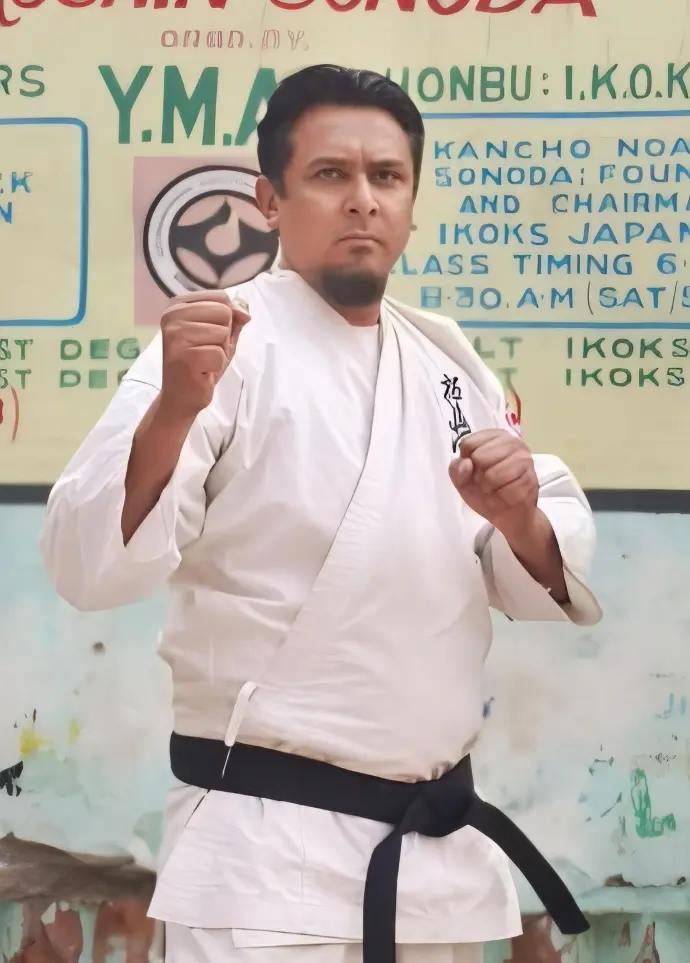
SENSEI JAWED AHMED
(1st Degree Black Belt,IKOKS, Japan)
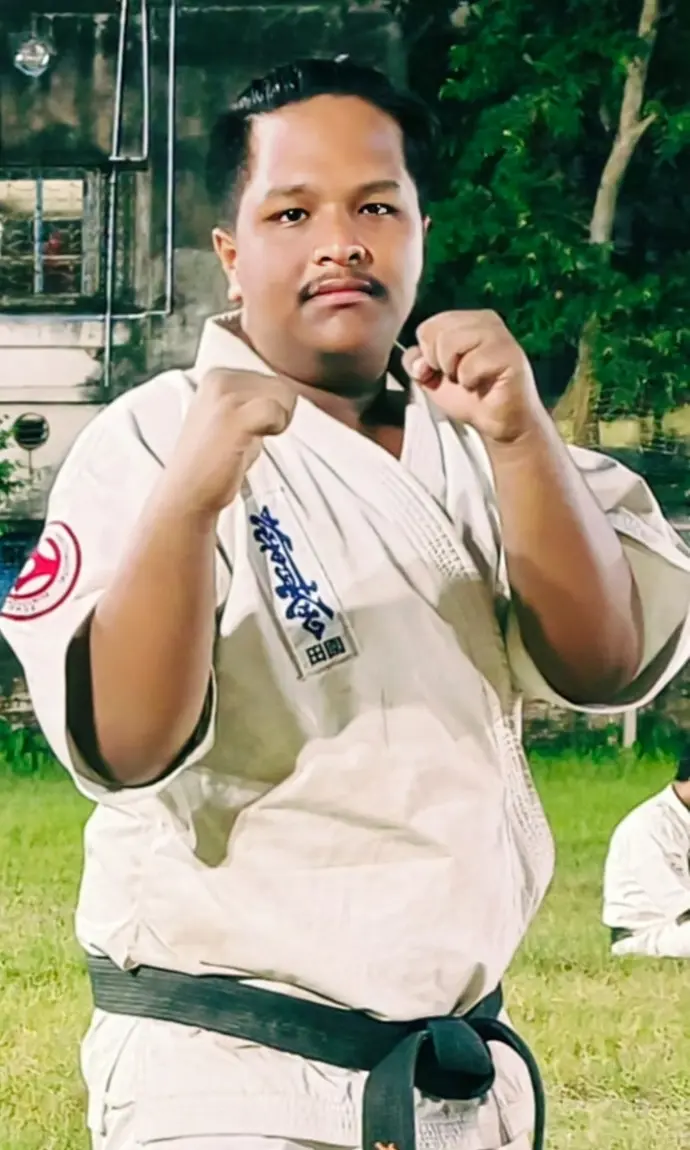
SENSEI DANIEL LEE
(1st Degree Black Belt,IKOKS, Japan)
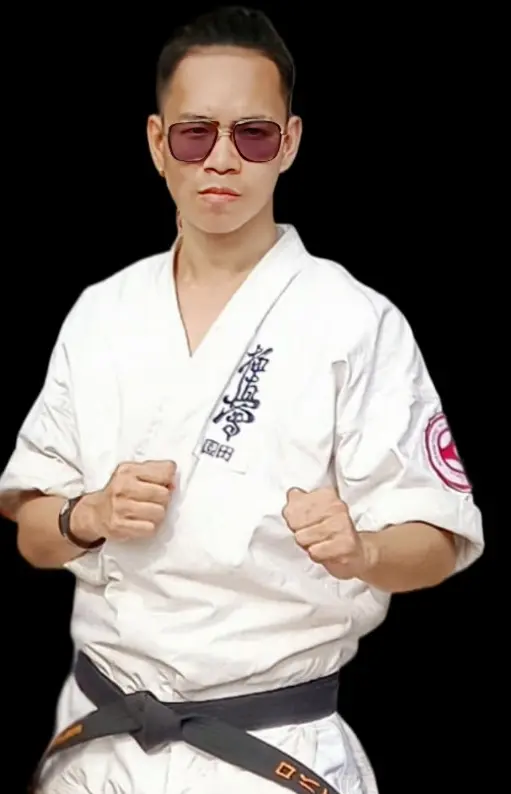
SENSEI ROBERT LEE
(1st Degree Black Belt,IKOKS, Japan)
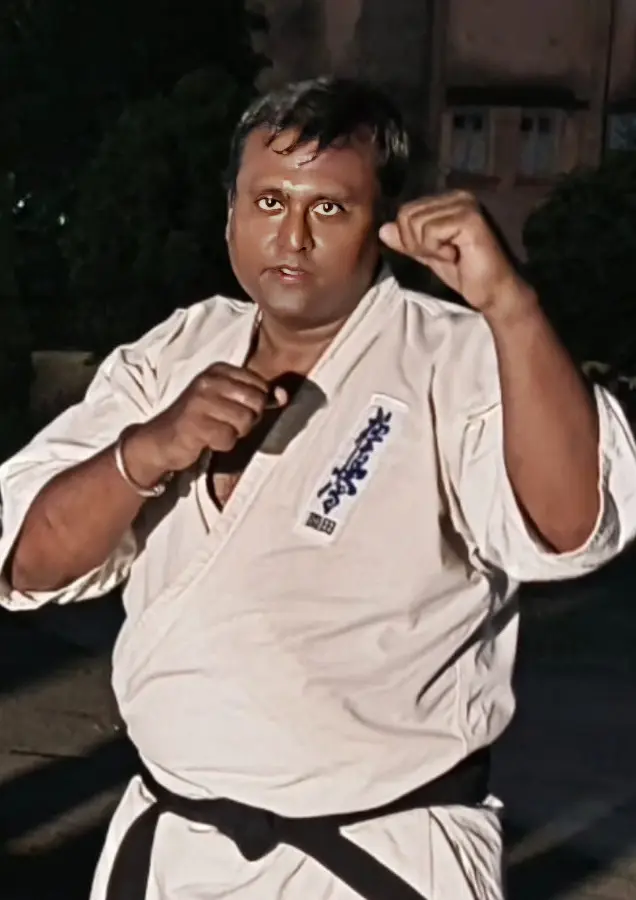
SENSEI SUMAN SARKAR
(1st Degree Black Belt,IKOKS, Japan)
Core Principles of Kyokushin Karate :
- OSU NO SEISHIN : The philosophy of “osu no seishin” or the spirit of perseverance is central to Kyokushin. Practitioners are encouraged to constantly strive for self-improvement, both in their martial arts practice and in their daily lives
- Strength and Endurance: Kyokushin training is designed to push the limits of physical endurance.
- Realism in Combat: Kyokushin’s full-contact sparring is a defining feature of the style.
- Humility and Respect: Despite the emphasis on combat effectiveness, Kyokushin also instills humility and respect for others. Practitioners are expected to show respect to their instructors, fellow students, and opponents, reflecting the traditional values of budo.
Dojo Kun :
1. We will train our hearts and bodies for a firm unshaken spirit.
2. We will pursue the true meaning of the Martial Way, so that in time our senses may be alert.
3. With true vigour, we will seek to cultivate a spirit of self-denial.
4. We will observe the rules of courtesy, respect our superiors and refrain from violence.
5. We will follow our religious principles and never forget the true virtue of humility.
6. We will look upwards to wisdom and strength, not seeking other desires.
7. All our lives, through the discipline of karate, we will seek to fulfill the true meaning of the Kyokushin Way.